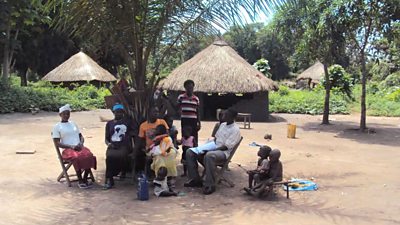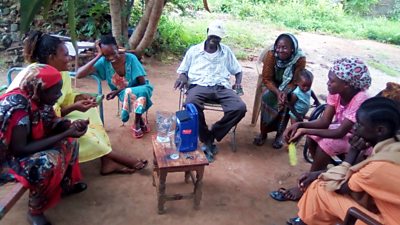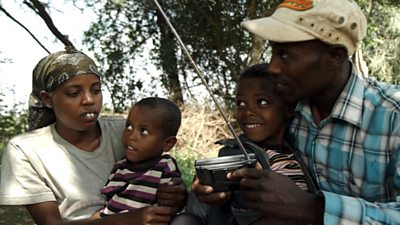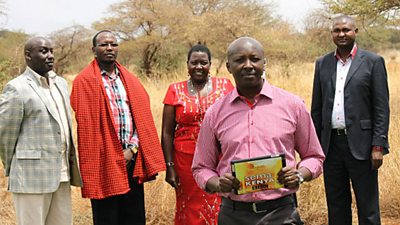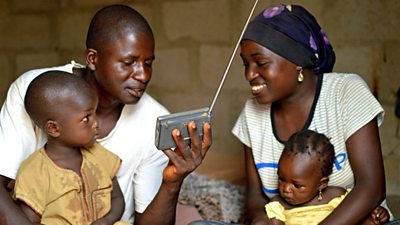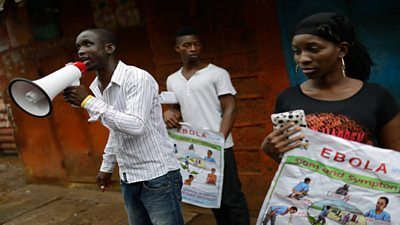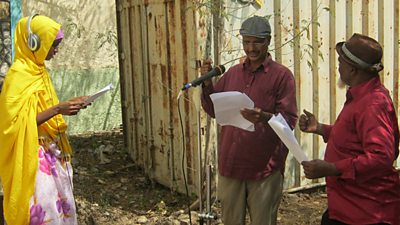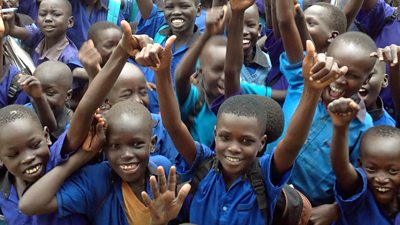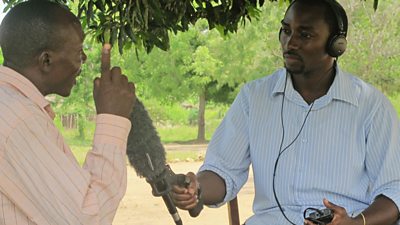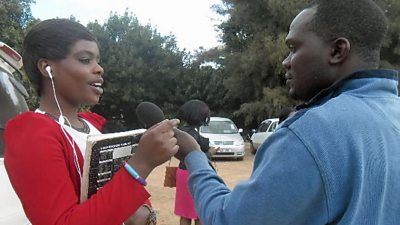Life In Lulu dramatises what happens when characters make – or fail to make – healthy choices
We're celebrating Lulu at 10 - read more!
Welcome to Lulu, a village in rural South Sudan. Lulu is 50 km from the nearest town and with its green and yellow maize farms, circular thatched homes and thriving village market, is home to a lively line-up of characters.
There's Malish, the opinionated blacksmith with his blind faith in traditional practices; Faida, the humble and hard-working village brewer who became chief; Nyamal, a jealous and suspicious first wife; and Angelina, Lulu's health care worker/medical officer.
Malish, Faida, Nyamal and Angelina are just some of the characters in the radio drama, Life in Lulu, which explores what happens when people make good (and bad) decisions.
For nearly 10 years, Life in Lulu has echoed the experience of ordinary people in villages across the world’s youngest country.
In South Sudan, a strong patriarchal society means that girls often leave school early, marry young and have children young too. Gender-based violence is common, as is tribal conflict between different groups in society.
Since its first episode aired in January 2013, Life in Lulu has tackled all of these issues in turns: sharing trusted information from medical experts, dispelling myths and rumours and working to build a more peaceful and cohesive society, all using the power of drama.
Healthy choices
Based on ����ý Media Action's formative research conducted for the first season, focused on reproductive, maternal, neonatal and child health, the earlier episodes of Life in Lulu explored people’s beliefs about pregnancy, childbirth, death and child-rearing. For example, the research revealed that many women felt they would be criticised as bad mothers if they decided to breastfeed their babies without giving them any other food or water for six months. Some also believed that a woman only has a complicated pregnancy or painful delivery if she has been unfaithful.
Tackling such beliefs, Life in Lulu dramatised what happens when characters make choices such as whether or not to deliver a baby in a health facility with a trained birth attendant.
Tackling conflict
Since 2014, South Sudan has faced ongoing conflict: targeting of ethnic groups by others, cattle rustling, revenge attacks, and the use of rape as a weapon. Life in Lulu’s storylines have evolved to reflect this tension and conflict, and to examine themes of peacebuilding, reconciliation, and resilience. More recent seasons have reflected the changing nature of South Sudan’s society and safety around landmines: seasons 3, 4, 5 and 6 focused on democracy alongside conflict mitigation and peace themes, while our current seasons 7 and 8 focus on non-violent conflict resolution and media independence, in the run-up to planned elections in 2023.
If the election is to go ahead, and if citizens are to participate effectively in the election and voting process, there is a need for a peaceful environment, access to rural areas and widespread acceptance of election results.
Life in Lulu tells stories that reflect these themes. Season 7 spanned 38 episodes, including one focused on the impact of violent conflict on communities’ economies.
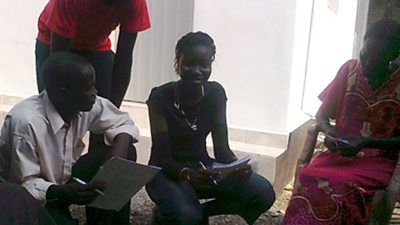
Anticipating an attack
Episode 18 follows characters Majak and Malish just outside of Lulu village, where they are anticipating an attack:
It is very quiet; the sound of dogs barking is heard. Majak and Malish talk in whispers – talking about when the attackers will come and recalling a previous attack. Suddenly Majak tells Malish to be quiet. They can hear footsteps approaching in the bush.
Majak asks who is moving in the grass. Who’s there? A shout. They’re here! Then a gunshot. And another. Majak cries out in pain. Majak is shot, Malish and the others attend to him. They can hear the police chasing the attackers. A senior policeman tells them to get Majak to the church and find Angelina the village medical officer. The police will go after the attackers. They should not have been taking the law into their own hands.
There’s a shout – there is a fire at the restaurant. The policeman runs off. Angelina checks his injuries and explains that they are not too bad and that he will be fine. As she treats Majak, Majak’s wife Akello cries and blames Majak for not listening.
Settling community disputes
A later episode examines the role of village councils in settling community disputes:
Majak’s wife Akello is unhappy with how Chief Faida is handling the case of Majak’s shooting, which was instigated by people in the neighbouring village of Kiba. Akello wants revenge, but the chief is pushing for dialogue with the chief in Kiba. Akello then accuses Chief Faida of stealing council funds.
Later, Faida returns to Lulu and notices that everything is very quiet. Where is everyone? Another Lulu resident, Ben, Lulu’s police officer, approaches and asks her to come to the police station. Everyone has gathered for a council meeting, he says, because there have been serious allegations about corruption and theft of council funds, and she must explain her position to the police.
Amid the drama and suspense, through these episodes and others, the characters in Lulu learn that taking the law into their own hands doesn’t end well, and that violence begets violence - revenge attacks do no one good. Only peaceful discussions will help the community resolve their disputes.
As real as possible
Getting the message across in the most entertaining and realistic way possible is the production team’s biggest priority. And they use all kinds of ways to do it.
For a scene in which a drowning fisherman is saved by a girl, the team used a children's paddling pool – and actors willing to get their feet wet – to convey the dramatic rescue.
Encouraging such creativity and professional production techniques among producers is central to the training which forms an important part of the project. Recognising the lack of radio drama experience in South Sudan, ����ý Media Action worked in partnership with a local group called Woyee Film and Theatre Industry to help build their skills, so they can branch out into radio drama production.
Getting the message across in the most entertaining and realistic way possible is the production team’s biggest priority. And they use many ways to do it – it’s part of why Life in Lulu is so adored by listeners.
Spanning the whole country
Life in Lulu was originally produced in two languages, English and Juba Arabic. It is no longer broadcast in English, which is not a first language for most of the country, but is now broadcast in Nuer, Dinka, local Arabic, Murle, Toposa and Didinga.
The programme is broadcast nationally in South Sudan through partnerships with 28 radio stations.
Project information
| Project name | Life in Lulu Series 7&8: Non-Violent Conflict Resolution and Independence of Media |
| Funder | Norwegian Ministry of Foreign Affairs, Global Affairs Canada (previously DFID, Danish Church Aid) |
| Dates | November 2020 – January 2023 (previously 2011-2017 and 2018-2019) |
| Themes | Peaceful co-existence (previously health) |
| Outputs | Life in Lulu |
| Broadcast partners | 28 partner stations including UN radio - Miraya FM |
| Partners | Civil society organisations; NNGOs; radio stations (previously the Ministry of Health, South Sudan) |
Our research and insight from Life in Lulu
Our projects in South Sudan
-
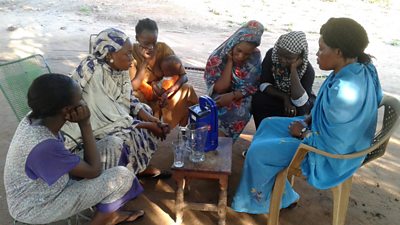
Life in Lulu: A beloved radio drama turns 10
Our radio drama Life in Lulu has covered a myriad of storylines in the last 10 years - from health and saving the lives of mothers and babies, to reducing conflict and promoting peaceful co-existence. -
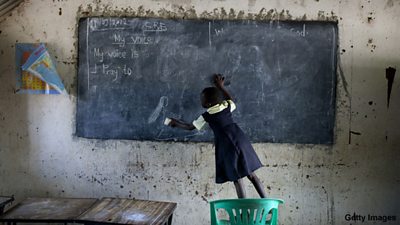
Our School: inspiring brighter futures for girls in South Sudan
A radio and outreach project aims to raise awareness of the importance of education for girls in South Sudan. -
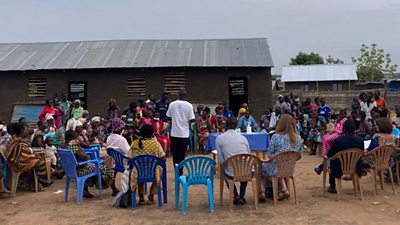
“Let’s Talk About Us” - tackling taboos about reproductive health
Our radio programme is sparking conversations about sexually transmitted infections, child marriage, early pregnancy, gender-based violence, puberty, menstrual hygiene and contraception. -
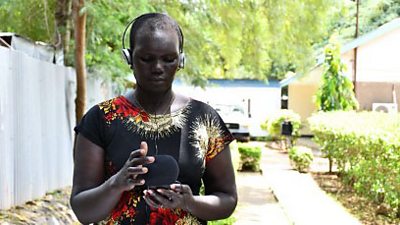
Building futures in South Sudan
Youth-focused radio programme Building Futures challenged negative perceptions of technical vocational education and training, and provided young people advice about job searching and starting their own businesses.

